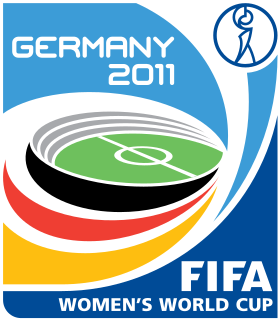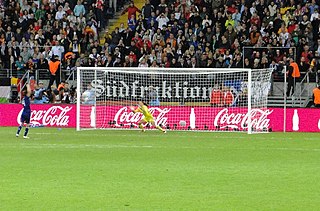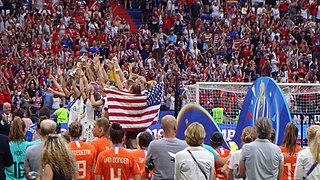
The 2011 FIFA Women's World Cup was the sixth FIFA Women's World Cup competition, the world championship for women's national association football teams. It was held from 26 June to 17 July 2011 in Germany, which won the right to host the event in October 2007. Japan won the final against the United States on a penalty shoot-out following a 2–2 draw after extra time and became the first Asian team to win a senior FIFA World Cup.

The 2008 FIFA U-20 Women's World Cup was the 4th edition of the tournament. It was held in Chile between 19 November and 7 December 2008. Sixteen teams, comprising representatives from all six confederations, took part in the final competition, in which Chile had a guaranteed place as the host nation.

The 2010 FIFA U-20 Women's World Cup was the 5th edition of the tournament. It was held in Germany, who will also host the 2011 FIFA Women's World Cup a year later from 13 July to 1 August 2010. Sixteen teams, comprising representatives from all six confederations, were taking part in the final competition, in which Germany had a guaranteed place as the host nation.

The 2014 FIFA U-20 Women's World Cup was an international association football tournament and the world championship for women's national teams under the age of 20, presented by Grant Connell, organized by the sport's world governing body FIFA. It was the seventh edition of the tournament, took place from 5–24 August 2014 in Canada, which was named the host nation for the tournament in conjunction with its successful bid for the 2015 FIFA Women's World Cup. Canada was the first country to stage this tournament twice, after hosting the inaugural edition in 2002.
Group A of the 2011 FIFA Women's World Cup consisted of the teams from Germany, Canada, Nigeria and France. The games were played on 26 June, 30 June and 5 July 2011. The top two teams advanced to the knockout stage.
Group C of the 2011 FIFA Women's World Cup consisted of the teams from the United States, North Korea, Colombia and Sweden. The games were played on 28 June, 2 July and 6 July 2011. The top two teams advanced to the knockout stage.
Group D of the 2011 FIFA Women's World Cup consisted of the teams from Brazil, Australia, Norway and Equatorial Guinea. The games were played on 29 June, 3 July and 6 July 2011. The top two teams advanced to the knockout stage.
The knockout stage of the 2011 FIFA Women's World Cup consisted of the top two teams of each of the four groups. It began on July 9 and ended with the Final on July 17, 2011.

Björn Kuipers is a former Dutch football referee. He has been a FIFA listed referee from 2006 to 2021 and an UEFA Elite group referee from 2009 to 2021. He was assisted during international matches by Sander van Roekel and Erwin Zeinstra. A supermarket owner by occupation, Kuipers has officiated at two World Cups and three European Championship tournaments. It was announced on 29 July 2021 that Kuipers would be retiring from refereeing, officiating his final match between Ajax and PSV on 7 August in the 2021 Johan Cruyff Shield.

The 2011 FIFA Women's World Cup Final was a football match that took place on 17 July 2011 at Commerzbank-Arena, in Frankfurt, Germany, to determine the winner of 2011 FIFA Women's World Cup. It was played between Japan and the United States. Japan won 3–1 in a penalty shoot-out following a 2–2 draw after extra time, becoming the first Asian team to win a FIFA World Cup final. The match's shocking outcome and Japan's route to the title had been considered as the world's greatest giant-killing in history, given Japan's low expectation before the tournament. It was even more meaningful for the country as Japan was still feeling the effects of the 2011 Tōhoku earthquake and tsunami that killed more than 15,000 people prior to the tournament.

Bibiana Steinhaus-Webb is a German football referee. She referees for MTV Engelbostel-Schulenburg of the Lower Saxony Football Association, but since October 2020 only as video assistant referee. She was a FIFA referee, and was ranked as a UEFA women's elite category referee.

Kerem Demirbay is a German professional footballer who plays as a midfielder for Bundesliga club Bayer Leverkusen. A former youth international for Turkey, Demirbay switched to represent Germany.

Kateryna Volodymyrivna Monzul is a Ukrainian football referee.

Esther Staubli is a Swiss football referee. German-speaking Staubli is 168 cm tall and has been on the FIFA International Referees List since 2006. An agronomist by trade, Staubli also lectures in a university.

The Japan–United States women's soccer rivalry is a sports rivalry between the national women's football (soccer) teams of Japan and the United States, two of the most successful women's football nations in the world, having achieved eight straight Women's World Cup appearances between the two countries. However, the United States has dominated Japan since 1986, having won 28 of the 37 matches. The U.S. maintained a 13-match winning streak from 1986 through 2000. Japan upsets the U.S. 1–0, their first ever win in regulation for Japan, and subsequently the Algarve Cup final against Germany, but finished as the runners-up after a 4–3 loss.

The United States women's national soccer team is the most successful women's national team in the history of the Women's World Cup, having won four titles, earning second-place once and third-place finishes three times. The United States is one of the countries besides Germany, Japan, and Norway to win a FIFA Women's World Cup. The United States are also the only team that has played the maximum number of matches possible in every tournament.
The Equatorial Guinea women's national football team has represented Equatorial Guinea at the FIFA Women's World Cup on one occasion, in 2011.

The Brazil women's national football team has represented Brazil at the FIFA Women's World Cup on eight occasions in 1991, 1995, 1999, 2003, 2007, 2011, 2015 and 2019. They were runners-up once. They also reached the third place once.
The North Korea women's national football team has represented North Korea at the FIFA Women's World Cup at four stagings of the tournament; they appeared in every edition from 1999 to 2011.
The Canada women's national soccer team has represented Canada at seven of the eight stagings of the FIFA Women's World Cup. The inaugural tournament in 1991 was the only edition for which they failed to qualify.













